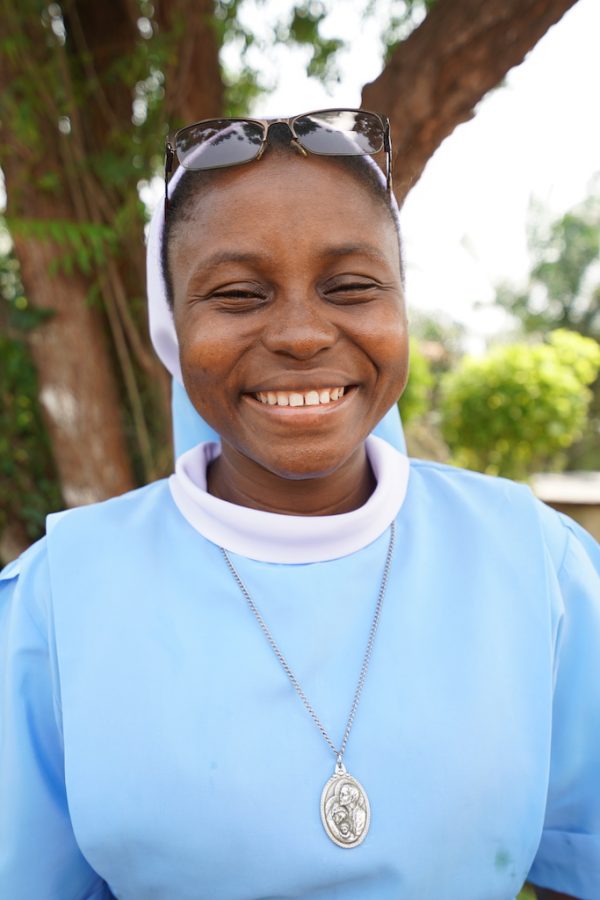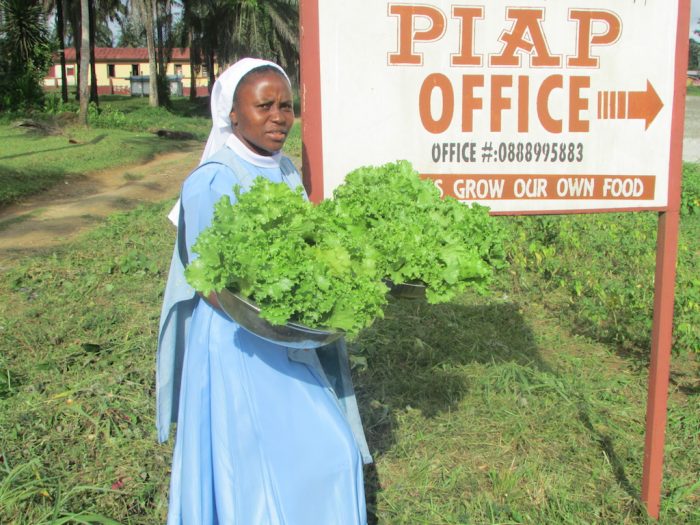Teaching to Fish and Overcome Poverty – Liberia
The story of one remarkable woman.
“I believe in empowering people so that instead of giving all the time, it’s good to help them learn how to fish for themselves”, states Sister Wilhelmena.
As the Chinese proverb says, you give a man a fish, you feed him for the day. Teach him how to fish, you feed him for a lifetime.
Her statement encapsulates the heart of a remarkable woman whose presence fills the room with joy and who speaks with such passion about her work that it’s contagious.
She is a Sister of the Holy Family, an indigenous group in Liberia who work in the diocese of Cape Palmas in the far southeast of the country. Here they focus on supporting families through their work in hospitals, schools, and the local community.
Sister Wilhelmena’s primary role is that of nurse and social worker at St Francis Clinic, Pleebo.
Lives being transformed
However, on a Saturday you will find her surrounded by young people, digging in the lush green fields near to the convent.
This is the work that brings her most joy. She explains how on a daily basis she sees people come and bring their problems, “Oh, Sister, I don’t have this, I need that,” they say. “This is why I studied social work. In our programme we are combining agriculture with education so we can help to reduce poverty,” enthuses sister Wilhelmena.
So in 2012, in response to the poverty around her, Sister Wilhelmena started a program, Peoples Initiative Against Poverty.
On Saturdays twenty five to thirty young people come and learn how to cultivate crops.
“It’s not only about farming that we discuss. We talk about transparency, hard work, accountability, and all those little things,” she says. The young people come to the convent when they have free time or if they are not able to attend school. “When they come in at first, they are like street kids that will talk any kind of loose words and all that, but as they stay in the program, they start to change their way of talking, the way they interact.“
Take Jackson for example. He was having so many problems at school that he had stopped attending. He was idle and initially, he would just hang around. After a while he became more involved and we gave him the responsibility of assisting the Program Director. You could see that being given such responsibility boosted his confidence, and we noticed a drastic change in his behaviour.
After a while his parents also noticed changes. Jackson would go home and help his parents around the house. ‘I can’t even believe it! I can’t believe that my son is behaving like this. He has changed a lot,’ his mother said.
Jackson himself has brought others into the program and is currently studying at university. “I find so much joy in this work. In the evenings after working hard all day, you’d expect the young people to be rushing home, but they’ll just sit, hang around. They feel comfortable there. I see a lot of change.”
She observes the younger ones learning from and being motivated by the older ones or those who are now able to attend school. The program is bringing hope to the lives of these young people.
Hope for a better future
When the program is able, it uses extra funds to provide scholarships for school fees and transportation. A number of children have now successfully completed primary or secondary school with the program’s assistance and three students are currently enrolled in university.
“I want to go to school, but my parents can’t afford it. So I want to help on the farm, in case one day we are successful and I can go to school”, reports one young man. The parents are also extremely grateful that their children have been given this opportunity, “God just worked a miracle”, one mother reported.
“The program is going well”, states Sister Wilhelmena. “Recently, we’ve been thinking of ways to make this program sustainable. The local people eat a lot of goat, particularly on special occasions, so we have built pens and have begun rearing goats for selling. We have also started a fish farm with the support of another local NGO.”
How does MAF make a difference?
“This area is rural so a lot of business activities take place in Monrovia, the capital. We purchase almost everything, do our banking and attend meetings there, so we use MAF regularly. Sometimes when the roads are bad, we are trapped. There’s no way to get out to carry on the work we do. It’s not only to the church but the entire country who’s been facing problems with roads. MAF’s presence in Liberia has brought great relief. We are very, very grateful. You can ask anybody in this region that has ever flown with MAF and they’ll tell you we are grateful.
On the plane it takes 1 ½ hours, but by road it’s two days. If the roads are bad, sometimes we spend about a week. A week! We get stuck in the mud and it’s very difficult. Even the Bishop has said about MAF, ‘These people are really doing the work of God’.
It’s also the little things that we admire, such as the pilot praying before we take off, their kindness toward us and the way they interact. We are truly grateful.”






